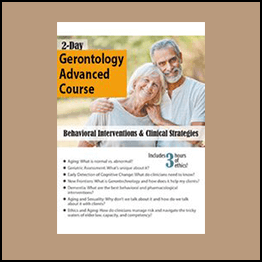Geoffrey W. Lane – 2 Day Gerontology Certificate Course
Geoffrey W. Lane – 2 Day Gerontology Certificate Course
For Geoffrey W. Lane – 2 Day Gerontology Certificate Course
America’s older population is rapidly expanding, and the need for well-trained and proactive geriatricians is growing daily. Clinicians working in eldercare need to stay abreast of new and current developments across multiple disciplines to serve our aging clients well.
Many different aspects of aging, along with appropriate treatment strategies, are explored including: normal aging, the promotion of healthy cognitive and emotional aging, aging and sexuality, spirituality and aging, and clinical and ethical issues around death, dying, and bereavement. The course focuses on problems of aging, including special considerations in geriatric assessment, and the mild and major neurocognitive disorders and how professionals can best meet the needs of these clients. The course also addresses the unique ethical issues that arise in the context of eldercare including special considerations in confidentiality, working with adult children of elders, future planning, elders at risk, safety issues and dementia care, capacity/competency, and end-of-life decision-making. After this 2-day comprehensive course you’ll leave with increased confidence in working with your elderly clients.
- Establish how evidence based theories on aging influence the field of gerontology.
- Determine what constitutes “normal aging” and describe how clinicians can discriminate it from cognitive decline.
- Communicate how clinicians can operationalize research related to nutrition, exercise and socialization to improve the wellbeing of older clients.
- Delineate how technological innovations in living environments can be used to help increase support, independence and quality of life for the elderly.
- Analyze and summarize research exploring the relationship between spirituality, aging and positive health outcomes.
- Specify how the cultural background of clients can impact end of life decisions and care needs.
- Determine an approach to evaluate and assess the cognitive function of geriatric clients.
- Characterize how clinicians can differentiate between types of dementias by understanding the manifestations of each type.
- Evaluate how safety risks related to major neurocognitive disorders in older adults can be identified and mitigated.
- Correlate how issues surrounding aging, dying, and bereavement impact clinical approach with clients and their families.
- Communicate appropriate strategies for clinicians to handle ethical issues related to confidentiality and capacity when working with the geriatric population.
- Connect current research on dementia causes and treatments to potential impacts on clinical interventions in the future.
NORMAL AGING AND THE PROMOTION OF HEALTHY AGING
- The Multidisciplinary Field of Gerontology
- Normal Aging
- Cognition
- Physical health
- Mental health
- Sexuality
- Clinical strategies to promote positive aging
- The role of midlife
- Socialization
- Exercise
- Nutrition
- Gerontechnology interventions
- Supportive systems and aging in place
- Current technologies
- Future horizons
- Ethics of technology
- Supportive systems and aging in place
- Ethics, aging, and future planning
- Spirituality
- End of life care
- Death, dying, and bereavement
WHEN AGING GOES AWRY
- Early detection: When aging is not so normal
- Geriatric assessment: Special considerations
- Cognitive
- Emotional
- Functional
- Mild neurocognitive disorders
- Major neurocognitive disorders
- Alzheimer’s disease
- Vascular Dementia
- Parkinson’s
- Lewy Body Dementia
- Chronic Traumatic Encephalopathy
- Dementia
- Clinical presentations
- Behavioral interventions
- Safety issues
- Pharmacological interventions
- Other disorders of aging
- Risk management: Ethics, aging, and elder law
- What clinicians need to know
- Elders at risk: Clinical, ethical, and legal considerations
- Confidentiality
- Working with adult children of elders
- Capacity/Competency
- Dementia and end of life care across cultures
- Current research in dementia: causes and treatments
Shipping method
– After making a purchase, you will see a View your order link to the Downloads page. Here you can download all the files related to your order.
– In case the link is broken for any reason, please contact us and we will resend a new download link.
– If you can’t find the download link, please don’t worry about it. This course is usually available and shipped within one day
– The course you purchased will have lifetime access
– Our support staff is the best by far! Please contact us at email: [email protected] and we will be happy to help!














